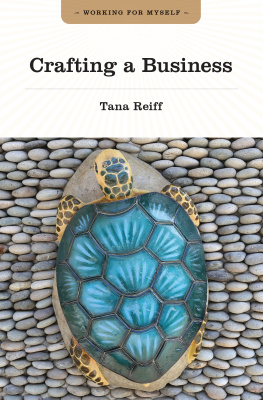All rights reserved. No part of this book may be reproduced or transmitted in any form or by any means, including photocopy, recording, or any information storage or retrieval system, without the prior written knowledge of the publisher.
Design: Lara Minja, Lime Design Inc.
Title: Handy all around / Tana Reiff.
Names: Reiff, Tana, author.
Series: Reiff, Tana. Working for myself.
Description: Series statement: Working for myself | Originally published: Belmont, CA : Lake Education, 1994.
Subjects: LCSH: Readers for new literates.
1
Its Not a Job
D ont have a job, dont want a job. Thats what Wayne Hiller told people when they asked what kind of job he had.
So what do you do ? they would ask.
This and that, Wayne would answer. This and that.
Those words were true. Need a paint job? Wayne can do it. Need a porch light fixed? Call Wayne. Need any leaves and brush cleared? Waynes your man.
Sometimes he would pass by a house and see a chore that needed doing. Then hed just go up to the door and knock.
I see your roof gutters are full of wet leaves, Wayne would say. I can clean them out for you.
Usually, the person at the door would say, Sure, go ahead. Ive been meaning to do that for a long time. What would you charge?
Whatever you think my work is worth, Wayne would say. Then he would get right to work. Hed clean out that gutter until it looked like new. When he finished the job, hed knock on the door again. Hed show the customer his work and take their payment.
Then Wayne would be on his way. Before long, hed find another house that needed something cleaned or fixed or painted. But he didnt have a job, he would say. And he didnt want one, either.
Job or no job, he was busy every day it didnt rain. And some days when it did.
No one knew how much money Wayne made. It was more than anyone might have guessed. He lived with his mom, giving her money for the rent and electric bill every month. He helped out with food and other items for their home. He put the rest of his money into his bank account.
The more work Wayne did, the more he knew he needed a truck. He might even want to buy a house someday. And it would be nice to have his own workshop, too. But for now, the money piled up, and Wayne kept on making more.
He didnt have a job , though. He didnt even like to hear people say he did odd jobs. I know Im odd, he would say. But dont call it a job. That always brought a laugh.
Waynes smile and easy way helped bring him a lot of work. If Wayne came up and knocked on your door, you liked him right away. You knew by his face and manner that he was a good guy. If he had worked for your friend or neighbor, you knew he did good work. If he had worked for you before, you knew how fair he was. Wayne Hiller was easy to trust. He trusted people back, too.
Its Not a Job
2
A Lot to Learn
I t all started when Wayne was in high school. Other kids were getting after-school jobs. But Wayne didnt want a job like that. He wanted to fix things around the house, thats all.
Wayne never seemed like a go-getter. But he was, in his own way. The other kids worked in stores or restaurants. Wayne went around and watched people working on their homes and yards.
After grade 10, Wayne helped Peggy Wiggin with yard work all summer and into the fall. One day she said, Wayne, I want to pay you.
You dont have to do that, Mrs. Wiggin, he said. I enjoy helping you out.
You may call me Peggy, she said. And I want to give you something for your trouble. After all, it is work. People get paid to work. You should get paid, too.
Peggy gave Wayne $5 every time he helped out. He did not spend money on clothes, or music, or girls, or anything else, except to help his mom.
Then one day Peggy Wiggin handed Wayne an extra few dollars. She said, Why dont you buy yourself a new shirt, Wayne? You should have enough money by now.
I dont need a new shirt, Wayne said. He brushed his hand against a hole in the shirt he was wearing. He touched the hole as if he could brush it away. Of course, he couldnt do that.
Just a thought, said Peggy.
They kept on raking. A few minutes later, Peggy asked, Wayne, what do you do with your extra money?
Oh, nothing, he said. I just save it.
Do you hide it away? she asked.
Yes, I hide it away.
Well, if youre not going to spend it, why dont you put it in the bank? That way, it can earn a little interest.
Interest? Wayne asked.
Its money, dear, Peggy said. The bank is paying you for the use of your money. Its not much, but its something.
How would I do that? Wayne asked.
Its easy, said Peggy. Anyone can open a bank account. Just take the money youve saved to a bank and they can help you. Then theyll give you a record of what youve deposited. And they will send you a card to use when you want to deposit or take out money.
So Wayne opened a bank account. That is how he began saving money. Saving became a habit.
Wayne also spent time with the old man who lived around the corner. Bill Garcias house was made of wood. He didnt want vinyl siding on his house. He liked the wood siding. But he had to paint it every few years. It was a big job, especially for a guy his age.
Wayne offered to help Bill Garcia paint his house. But the old man said he didnt want any help. Wayne asked if he could watch. Bill said he didnt like to be watched. But he said that Wayne could hang around and keep him company.
So thats what Wayne did. He kept Bill Garcia company. The two of them talked a little, but not much. Mostly, Wayne watched Bill work.
The old man worked very slowly. Wayne guessed that he probably moved faster when he was younger. But Wayne was glad the man worked slowly. Wayne could see everything Bill did. It was like watching a game played in slow motion. Bill was very, very careful. Just by watching, Wayne learned every step of a painting job.
When Bill finished the outside of the house, he began to paint the inside. Painting inside was different from painting outside. Room by room, Wayne watched the old man work.
The other person Wayne spent time with was his next-door neighbor. Harry Greer ran a small business out of his garage. He could repair just about anything anyone brought him. Kitchen appliances. Small machines. Chain saws. You name it. Harry Greer knew the inside of any machine you could think of.
Harry kept all kinds of parts in his garage workshop. Some of them hung from hooks on the wall. He kept big parts on a shelf. He kept the tiny parts in boxes.

















